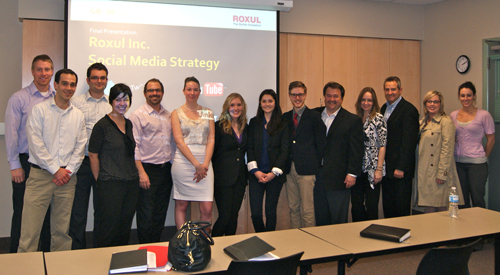
Good citizenship can’t be taught, but it can be learned. That’s one of the aims of the Co-operators Centre for Business and Social Entrepreneurship (CBaSE), based in the College of Management and Economics (CME), which runs a program matching teams of students with local organizations that need some extra help.
“Students come to us because they want something more before they graduate,” says Melanie Lang, CBaSE director and a professor in the Department of Marketing and Consumer Studies. “It’s also an opportunity to further enhance their skill set and the knowledge that they’re gaining from their respective majors.” The experience that students gain from working with community partners also enhances their future job applications.
Both sides benefit from the partnership: students receive course credit for applying their skills outside the classroom, while the community partners — including local charities, not-for-profit organizations and small business owners — benefit from the students’ expertise. “It’s one way CME and CBaSE are encouraging co-curricular student initiatives,” says Lang.
Students apply for the projects and are matched with a client based on their skills. As part of their application, students must include a list of courses they have taken. “If you’ve taken a particular course, then you’ll be better able to handle the client’s specific needs,” says Lang. Clients might need help developing a marketing plan, a branding strategy or their social media presence, and they may lack the resources to work on these projects themselves.
The students are assessed throughout the term and deliver mid-term and final presentations. Their final report gives the client a detailed explanation of the project and deliverables. After the projects are completed, Lang evaluates the students’ work, and the clients share their feedback. “That just reaffirms for the students that what they’re learning matters and makes a difference in the community,” she says.
The program is open to third- and fourth-year bachelor of commerce students, who work in teams with undergrads from other disciplines as well as graduate students who help with research questions. In the winter 2012 term, marketing students teamed up with computer science students in Prof. Qusay Mahmoud’s third-year software engineering class to develop apps for various clients. Students demonstrated their work during an “app fest” on April 4.
One app, called “Should This Bird Be Loaded,” was developed for the Poultry Industry Council. The app calculates how many chickens can be safely loaded onto a truck, depending on the birds’ weight and outdoor temperature and humidity. If it’s too hot outside, farmers need to transport fewer chickens to avoid overheating the birds. “You don’t want them cooked before you eat them,” says Richard Break, a third-year computer science student who worked on the app.
The marketing students on his team assessed the market and developed a survey asking farmers what type of mobile device they use most. The results showed that most farmers use BlackBerrys, so the students developed an app for that platform. “I learned a lot about chickens,” says Break, adding that he also learned how to use Java and HTML to design apps for BlackBerrys and other devices. This was the first app he had designed.
The CBaSE program is growing in popularity. “Our numbers have gone up,” says Lang. “It’s an awesome problem to have to manage. Our students want more projects, and our clients want more students.” She hopes students will learn how to become good citizens by helping others. “There is a relationship that is established between the students and their clients. It reaffirms that we’re doing something good and right and meaningful.”